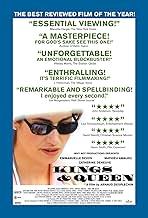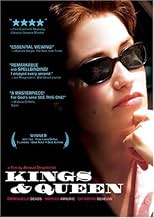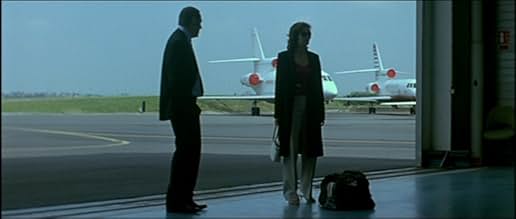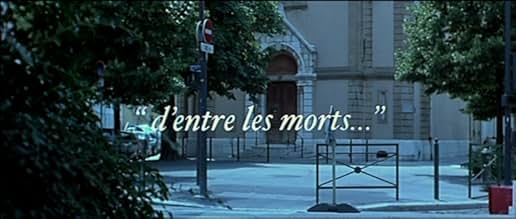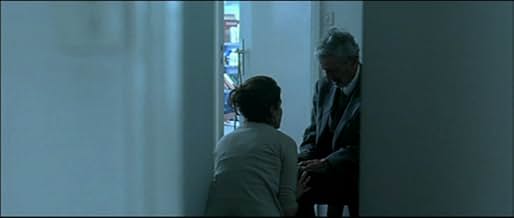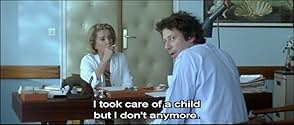Rois et reine
- 2004
- Tous publics
- 2h 30m
IMDb RATING
7.0/10
4.1K
YOUR RATING
Parallel storylines tell the current state of affairs for two ex-lovers: Nora's a single mother who comes to care for her terminally ill father; holed in up in mental ward, Ismael, a brillia... Read allParallel storylines tell the current state of affairs for two ex-lovers: Nora's a single mother who comes to care for her terminally ill father; holed in up in mental ward, Ismael, a brilliant musician, plots his escape.Parallel storylines tell the current state of affairs for two ex-lovers: Nora's a single mother who comes to care for her terminally ill father; holed in up in mental ward, Ismael, a brilliant musician, plots his escape.
- Director
- Writers
- Stars
- Awards
- 9 wins & 18 nominations total
- Director
- Writers
- All cast & crew
- Production, box office & more at IMDbPro
Featured reviews
How do you create a follow up to the two masterpieces that were "Comment je me suis disputé" and "Ester Kahn" (we won't talk about the dull "Léo... en jouant Dans la compagnie des hommes") ? You just listen to what your heart has to say, however hard and difficult it might be, and make no compromises. You don't fear to be misunderstood. You care about the audience but do not let them influence your work. You're a genius but you still have doubts, and these doubts make your art even better. "Rois et Reine" ("Kings and Queen"), Arnaud Desplechin's latest film, lasts 2h40mn and, in spite of its length and its harsh contents, is utterly entertaining, fascinating, moving and even funny. It does not fear to be (often) irritating and boring : the burlesque moments, for instance, are quite annoying, but then again, that's a personal point of view. The thing is, the storyline about Nora's relationship with her father and her ex boyfriend and her son, and then again Ismael's relationship with Nora's son and with his family are so powerful, they don't need more. Unfortunately, Desplechin is often reluctant to cut deep in his movie and as a result, "Rois et Reine" sometimes looks like a long, long ride. Add to that some unfortunate flash backs burdened by bad acting (the character of Pierre) and boy does the movie sound dull at times. Emmanuelle Devos and Mathieu Amalric, finding here the roles of a lifetime, are absolutely fascinating. When in the end, Nora discovers the secret pages of her father's diary, or when Ismael spends an afternoon with Nora's son, it's devastating. I've rarely seen a movie that translates human emotions so beautifully. Just for that, "Rois et reine" is a must see.
I was so hoping it would live up to the hype...and it almost does - but you know how it goes with extravagantly praised films.
Desplechin's 1996 "My Sex Life" was brilliant - a rambling, shambling, thoroughly engaging 3 hour trip through the lives of a group of rambling, shambling, lost characters, made by a director looking to pour as much raw life into a film as possible and let the rest sort itself out. He has no interest in a well-knit story....
This somehow doesn't work as well here...what is missing is the "engaging" part. This isn't a matter of his being unable edit himself; it's just characters and their situations just seem less able to cross the divide and touch you.
But i'm all in favor of Desplechin's intentions. This is a director definitely worthy of trust and respect. And can all those critics be wrong? I'm going to see this again.
"My Sex Life" had the benefit of three wonderful actors: Mathieu Almaric, Jeanne Ballibar and Emmanuelle Devos...we need more films from all three. Almaric and Devos return here. He is, as always, terrifically fun to watch. But this is her movie...Emmanuelle Devos seems to be coming into her own now, after years of playing lesser roles (The Beat my Heart Skipped). She is a marvel. Always playing the victim, stoic and long-suffering, and always bringing to this role a huge richness of feeling. She is heart-wrenching here, as she was in "My Sex Life", which she practically stole. And what a remarkable look she has...one moment the ugly duckling, another moment a ravishing beauty. I can't take my eyes off her. A great actress.
Desplechin's 1996 "My Sex Life" was brilliant - a rambling, shambling, thoroughly engaging 3 hour trip through the lives of a group of rambling, shambling, lost characters, made by a director looking to pour as much raw life into a film as possible and let the rest sort itself out. He has no interest in a well-knit story....
This somehow doesn't work as well here...what is missing is the "engaging" part. This isn't a matter of his being unable edit himself; it's just characters and their situations just seem less able to cross the divide and touch you.
But i'm all in favor of Desplechin's intentions. This is a director definitely worthy of trust and respect. And can all those critics be wrong? I'm going to see this again.
"My Sex Life" had the benefit of three wonderful actors: Mathieu Almaric, Jeanne Ballibar and Emmanuelle Devos...we need more films from all three. Almaric and Devos return here. He is, as always, terrifically fun to watch. But this is her movie...Emmanuelle Devos seems to be coming into her own now, after years of playing lesser roles (The Beat my Heart Skipped). She is a marvel. Always playing the victim, stoic and long-suffering, and always bringing to this role a huge richness of feeling. She is heart-wrenching here, as she was in "My Sex Life", which she practically stole. And what a remarkable look she has...one moment the ugly duckling, another moment a ravishing beauty. I can't take my eyes off her. A great actress.
(San Francisco Film Festival showing, March 22, 2005) An amazing if somewhat indigestible film, Desplechin's KINGS AND QUEEN (Rois et reine) is a genre-bending family drama that alternates wired comedy with solemn tragedy, in particular nutty violist Ismaël's (Mathieu Amalric's) tax problems and sudden third-party commitment to a mental hospital and ex-girlfriend Nora's (Emmanuelle Devos') discovery that her writer father is dying of advanced stomach cancer. Meanwhile Nora is haunted by memories of the father of her young son Elias (Valentin Lelong), is about to marry a rich "gangster," and other relatives wander in and out of a tumultuous narrative which alternates present tense scenes with flashbacks, dreams and fantasies. Buffoonery and melodrama, which are sometimes hard to separate, turn out to work well together as director Desplechin modestly points out is true of Shakespeare, whose King Lear may have given him the idea for the brutal, vindictive final letter Nora's father, Louis Jenssens (Maurice Garrel) leaves for her. The audience at the SFFF cheered a gratuitous sequence where Ismaël's father Abel (Jean-Paul Roussillon) singlehandedly subdues three punks trying to rob his convenience store while Ismaël looks on with terror. In the next scene, father and son are lifting weights together at a health club. The plan by Abel, who was himself adopted, to adopt a man who's lived with him and his wife for years, over the protests of his adult children, rhymes palpably with the question of Ismaël's adopting Elias, who doesn't like Nora's new man, Jean-Jacques (Olivier Rabourdin). The long scene where Ismaël explains to Elias why he can't adopt him, while they walk through a museum, is one of a number of tours de force.
Secondary characters in this overwritten but always entertaining drama make themselves hard to forget though buffoonery in the case of the Ismaël's junkie lawyer (Hypolytte Girardot); though their neediness, in the case of Arielle, "la Chinoise" a flirtatious 'princess' at the psych hospital, (Magalie Woch) or Nora's sister down-and-out Chloé, (Nathalie Boutefeu); bitchiness in the case of Ismaë's sister. Ismaël's usual shrink is a huge African grande dame; he gets his entrance exam and his walking papers at the hospital from none other than Catherine Deneuve (whose iciness and soulfulness would be an unforgettable blend even if she were not already one of the world's most beautiful sixty-somethings). The women are goddesses, bitches, or queens. Ismaël says women have no souls; but the story's main men are talented but narcissistic problem children. Elias seems poised to grow up into one of those too. Most of the acting is remarkable, or at the very least arresting. The mercurial Amalric and lovely Devos completely live up to their top billing. Still, even their parts might have done with some trimming back.
The movie comes with allusions to Leda and the Swan, Nietsche, Yeats, Emily Dickenson, and a large number of musical references including rap (and a break dancing demo by Ismaël at the mental hospital), Klezmer, Randy Newman and, as a framing device, Moon River. Suspicions that there may be too much going on here are stifled by sheer pleasure in the drama of it all.
Six César nominations in France, where it opened in late 2004.
The title may refer to Shakespeare's plays, or to the way paterfamilias are seen by their children. "Kings and Queen" is wildly unedited and at 2 ½ hours definitely too long; Desplechin even acknowledged repeatedly that his answers to questions after the SFFF showing were too long too. But his inability to edit his work down may be hard to separate from his unique flavor and charm. Desplechin wrote the excellent screenplay for "Un monde sans pitié" ("A World Without Pity," 1989) the story of a fascinating young loser. "Desplechin is a wonder with actresses, at least as long as they're with him: Devos' character is close enough to 'My Sex Life' star and former Desplechin paramour Mariane Denicourt that she responded to the movie with a retaliatory roman à clef," writes Sam Adams in the Philadelphia City Paper. A question about this contretemps met with a flurry of interesting doubletalk from the soft-spoken director.
Secondary characters in this overwritten but always entertaining drama make themselves hard to forget though buffoonery in the case of the Ismaël's junkie lawyer (Hypolytte Girardot); though their neediness, in the case of Arielle, "la Chinoise" a flirtatious 'princess' at the psych hospital, (Magalie Woch) or Nora's sister down-and-out Chloé, (Nathalie Boutefeu); bitchiness in the case of Ismaë's sister. Ismaël's usual shrink is a huge African grande dame; he gets his entrance exam and his walking papers at the hospital from none other than Catherine Deneuve (whose iciness and soulfulness would be an unforgettable blend even if she were not already one of the world's most beautiful sixty-somethings). The women are goddesses, bitches, or queens. Ismaël says women have no souls; but the story's main men are talented but narcissistic problem children. Elias seems poised to grow up into one of those too. Most of the acting is remarkable, or at the very least arresting. The mercurial Amalric and lovely Devos completely live up to their top billing. Still, even their parts might have done with some trimming back.
The movie comes with allusions to Leda and the Swan, Nietsche, Yeats, Emily Dickenson, and a large number of musical references including rap (and a break dancing demo by Ismaël at the mental hospital), Klezmer, Randy Newman and, as a framing device, Moon River. Suspicions that there may be too much going on here are stifled by sheer pleasure in the drama of it all.
Six César nominations in France, where it opened in late 2004.
The title may refer to Shakespeare's plays, or to the way paterfamilias are seen by their children. "Kings and Queen" is wildly unedited and at 2 ½ hours definitely too long; Desplechin even acknowledged repeatedly that his answers to questions after the SFFF showing were too long too. But his inability to edit his work down may be hard to separate from his unique flavor and charm. Desplechin wrote the excellent screenplay for "Un monde sans pitié" ("A World Without Pity," 1989) the story of a fascinating young loser. "Desplechin is a wonder with actresses, at least as long as they're with him: Devos' character is close enough to 'My Sex Life' star and former Desplechin paramour Mariane Denicourt that she responded to the movie with a retaliatory roman à clef," writes Sam Adams in the Philadelphia City Paper. A question about this contretemps met with a flurry of interesting doubletalk from the soft-spoken director.
Nora (the devastating and luminous Emmanuelle Devos) is a single mother who suddenly has to care for her dying father (a successful writer straining to put the finishing touches on his last book, a memoir of sorts) on the eve of marrying her new suitor. Ismael (the fantastic Mathieu Amalric) is her "ex-boyfriend" who cared for her son most of the boy's life, and is a struggling musician who suddenly finds himself trapped in the loony bin thanks to an over-zealous sister, a bitter friend, and a "judicial error." Director Desplechin (this is the only film I have seen of his) does a nice job flipping back and forth between the utter bleakness and emotional hell of caring for a dying parent, and the absurd serio-comic-horror of being stuck in the "crazy hospital" against your will.
There's a lot of play with psychoanalysis (highlighted by Catherine Denueve in a bit part as a psychiatrist) that is fun and illuminating to watch. There's speckles of romance, dark humor, nihilism, magic realism, and soap opera theatrics with lots of references to philosophy, mythology, and poetry that keep the film interesting and unpredictable even as its over two and a half hour run time tries your patience. There are plenty of revelations and big emotional payoffs here punctuated well with eclectic music choices (everything from classical pieces to some sort of catchy European hip-hop) and nice little surprises (Magalie Woch is delightful as the lovely suicidal mental patient who becomes smitten with Ismael). This utterly French film gives the viewer a lot to chew on, even if you have to gnaw through a bit of gristle before dining on the filet mignon.
There's a lot of play with psychoanalysis (highlighted by Catherine Denueve in a bit part as a psychiatrist) that is fun and illuminating to watch. There's speckles of romance, dark humor, nihilism, magic realism, and soap opera theatrics with lots of references to philosophy, mythology, and poetry that keep the film interesting and unpredictable even as its over two and a half hour run time tries your patience. There are plenty of revelations and big emotional payoffs here punctuated well with eclectic music choices (everything from classical pieces to some sort of catchy European hip-hop) and nice little surprises (Magalie Woch is delightful as the lovely suicidal mental patient who becomes smitten with Ismael). This utterly French film gives the viewer a lot to chew on, even if you have to gnaw through a bit of gristle before dining on the filet mignon.
10Fiona-39
There is SO much going on in this film, but it has rhythm, pace, a great soundtrack, and enjoyable, charismatic performances, that kept me engaged from the word go. The editing owes something to 60s Godard - lots of jump cuts in the dialogue scenes - and 80s Rohmer - anguished 30 somethings worrying about true love - and possibly, in its tour de force final sequence, a reference to La Jetee, which is also of course about memory, fate, and mortality. And then there is the rather bizarre Audrey reference which opens the film: as Nora steps out of a black car, clutching her morning coffee, clothed in black, her hair wound up on her head, the strains of Monn River sound. So far, so post-modern. This is is a film that is freighted with filmic, literary, theatrical (esp Shakespeare and the Tempest) and artistic allusions, but that uses these in service of a specific point: that these cultural references and allusions make the web of our being - that art is how we communicate to each other (notice that all the characters communicate through art - the gift Nora gives her father, the music Ismael dances to, the book the father writes - even the 'murder scene' is filmed through a highly stylised mise-en-scene): that 'artifice' can reveal the deepest and most moving of human emotions. It is a beautiful film that will move you and make you leave the cinema feeling transported. And Deneuve is just great! I love the bit where Ismael asks her if anyone has ever told her she's beautiful, and she gives a slight twist of her lips, sighs, and says, yes, she has heard that before. Just because something has become cliché, doesn't mean it's not true.
Did you know
- TriviaThe title of the movie was inspired to Arnaud Desplechin by the five first lines of a poem by Michel Leiris: "Rois sans arrois Reine sans arène Tour trouée Fou à lier Cavalier seul"
- Quotes
Nora Cotterelle: There are four men I loved. I killed two of them.
- ConnectionsReferenced in Trust the Man (2005)
- SoundtracksPavane pour une Infante défunte
Composed by Maurice Ravel
- How long is Kings & Queen?Powered by Alexa
Details
- Release date
- Country of origin
- Official sites
- Languages
- Also known as
- Kings & Queen
- Filming locations
- Production companies
- See more company credits at IMDbPro
Box office
- Budget
- €3,871,153 (estimated)
- Gross US & Canada
- $290,973
- Opening weekend US & Canada
- $16,101
- May 15, 2005
- Gross worldwide
- $3,839,556
- Runtime
- 2h 30m(150 min)
- Color
- Sound mix
- Aspect ratio
- 2.35 : 1
Contribute to this page
Suggest an edit or add missing content

